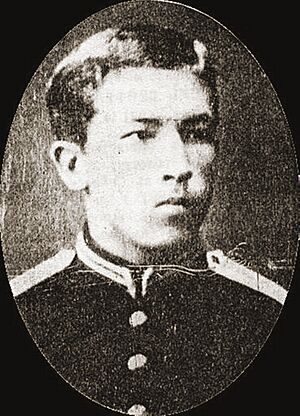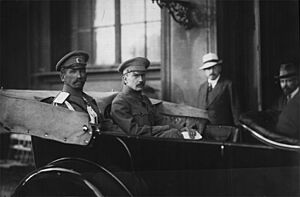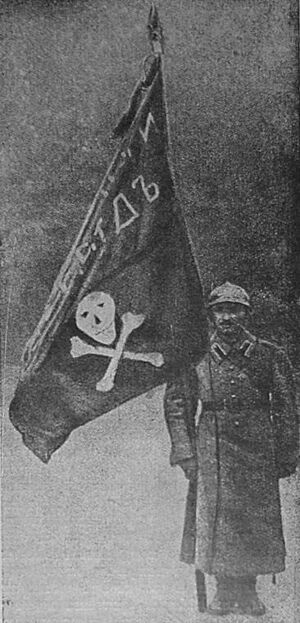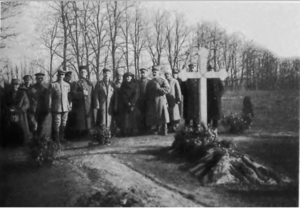Lavr Kornilov facts for kids
Quick facts for kids
Lavr Kornilov
|
|
|---|---|
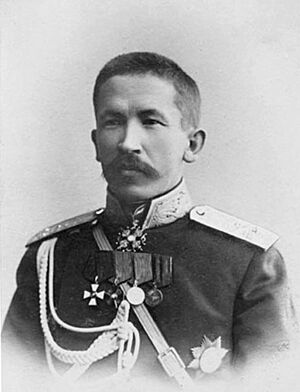
Kornilov in 1916
|
|
| Born | 30 August 1870 Ust-Kamenogorsk, Semirechye Oblast, Russian Turkestan, Russian Empire |
| Died | 13 April 1918 (aged 47) near Yekaterinodar, Russian SFSR |
| Allegiance | |
| Service/ |
|
| Years of service | 1892–1918 |
| Rank | General of the Infantry |
| Commands held |
|
| Battles/wars | |
| Awards |
|
Lavr Georgiyevich Kornilov (Russian: Лавр Гео́ргиевич Корни́лов; 30 August 1870 – 13 April 1918) was a Russian general. He was also a military intelligence officer and an explorer. He served in the Imperial Russian Army during World War I. Later, he fought in the Russian Civil War.
Kornilov is mostly known for the Kornilov Affair. This happened in 1917. It was an attempt to make the government stronger. But it failed and led to Kornilov's arrest. This event also weakened the government at the time.
After escaping from prison in November 1917, Kornilov became a military leader. He led the Volunteer Army. This army was against the Bolsheviks in southern Russia. His forces were often outnumbered. He was killed on 13 April 1918. This happened during a fight near Yekaterinodar.
Contents
Kornilov's Early Life and Military Career
Lavr Kornilov was born into a Siberian Cossack family. He joined military school in Omsk in 1885. Later, he studied at the Mikhailovsky Artillery Academy in St. Petersburg.
In 1892, Kornilov became a lieutenant. He was sent to the Turkestan Military District. Here, he explored areas in Eastern Turkestan, Afghanistan, and Persia. He learned several Central Asian languages. He also wrote detailed reports about his travels.
Kornilov then attended the Nikolayev General Staff Academy. He graduated as a captain in 1897. He chose to return to the Turkestan Military District. There, he continued his work as a military intelligence officer. In 1904, he tried to travel secretly to British India. However, he was quickly found out.
During the Russo-Japanese War (1904-1905), Kornilov served as a Chief of staff. He fought in important battles like Battle of Sandepu and Battle of Mukden. For his bravery, he received the Order of St. George. He was also promoted to colonel.
After the war, Kornilov worked as a military attache in China from 1907 to 1911. He learned Chinese and traveled widely. He studied Chinese history and customs. He also met Chiang Kai-shek, who would later become China's president. In 1911, he became a commander in the Russian army.
World War I and Its Impact
In 1914, when World War I began, Kornilov commanded the 48th Infantry Division. They fought in Galicia and the Carpathians. In 1915, he became a major general. During heavy fighting, he was captured by the Austrians. This happened in April 1915.
Kornilov was an important prisoner of war. But in July 1916, he managed to escape. He made his way back to Russia and returned to duty.
After Tsar Nicholas II gave up his throne in March 1917, Kornilov was given command of the Petrograd Military District. He placed the Empress Alexandra and her children under house arrest. Later, he resigned from this role. He then became commander of the Russian Eighth Army. His army won a big victory against the Austrians. This was Russia's only major military success in 1917.
In July, he became commander of the southern front. A week later, he was made the Supreme Commander-in-Chief of the Provisional Government's armed forces.
The Kornilov Affair
In 1917, many people in Russia were unhappy. They doubted if the Provisional Government could solve the country's problems. There was a lot of trouble in the army and the economy.
Kornilov believed that the Petrograd Soviet was causing problems for the military. He also thought the Provisional Government was too weak to control the Soviet. After some unclear messages between Kornilov and Alexander Kerensky, Kornilov ordered his troops to move towards the Petrograd Soviet.
However, the Petrograd Soviet quickly gathered many workers and soldiers to defend themselves. Because of this, Kornilov's plan failed. He was then arrested. The "Kornilov Affair" made Russians trust the Provisional Government even less.
The Russian Civil War
After his plan failed, Kornilov and his supporters were arrested. They were held in the Bykhov jail. In November, they escaped from jail. The jail guards were actually Kornilov's supporters, which made the escape easier. They went to the Don region. This area was controlled by the Don Cossacks.
There, they joined General Mikhail Alekseev. Kornilov became the military leader of the anti-Bolshevik Volunteer Army. Alekseev was the political leader.
The Kornilov Shock Detachment was a famous volunteer unit. It was named after him. Other anti-Bolshevik groups, like the Kuban Cossack Kornilov Horse Regiment, also took his name. Kornilov's forces were known for their special insignia. This symbol appeared on their flags and uniforms.
Kornilov believed the Bolsheviks were dangerous traitors. He felt they were destroying Russia's unity and had to be stopped. His adjutant remembered that Kornilov "loved only Russia itself" and served it his whole life.
In February 1918, the Bolsheviks took control of Rostov and Novocherkassk. Kornilov then led the Volunteer Army on a long journey called the 'Ice March'. They marched into the empty steppe towards the Kuban. Even though they were greatly outnumbered, they avoided being destroyed by the Bolsheviks.
On 10 April, they began to attack Ekaterinodar. This was the capital of the Kuban Soviet Republic. However, on 13 April, a Soviet shell hit Kornilov's headquarters. He was killed. He was buried quietly in a nearby village.
A few days later, the Bolsheviks found his grave. They removed his coffin and took his body to the main square. His remains were then burned.
Memorials
On 13 April 2013, a monument to General Kornilov was built in Krasnodar. Cossacks from different regions held ceremonies to honor him.
Honours and Awards
- Order of St. Stanislaus, third degree (1901), 2nd degree (1904 and 1906 with swords)
- Order of St. Anne, 3rd degree (1903) and 2nd degree (6 December 1909)
- Order of St. George, 4th degree (9 August 1905) and 3rd degree (28 April 1915)
- Gold Sword for Bravery (9 May 1907)
- Badge of the 1st Kuban (Ice) campaign (3 October 1918), given after his death
See also
 In Spanish: Lavr Kornílov para niños
In Spanish: Lavr Kornílov para niños
 | Aurelia Browder |
 | Nannie Helen Burroughs |
 | Michelle Alexander |


